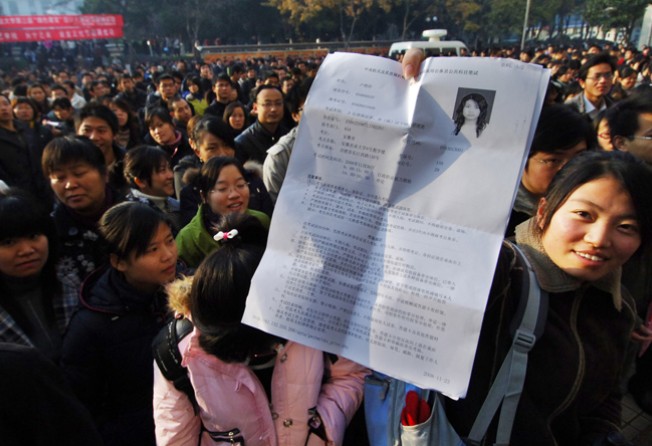
In tight times, jobseekers turn to stability and security of civil service
Eschewing foreign firms, young graduates enrol in training courses to learn how to 'think' like officials and win plum government positions

As the mainland job market grows tougher, more fresh graduates are turning once more to the civil service for a safe if unexciting career that offers reasonable pay and a host of benefits.

"If we work for private or foreign companies, we can only expect to earn about 3,000 or 4,000 yuan (HK$3,300 to 5,000) a month," Xu said.
"But a meal costs at least 20 yuan and a flat in the city more than two million yuan. Only a civil service post offers a stable and decent life, as we don't have to worry soaring medical and housing costs."
This year's enrolment for the test is about 1.5 million, up sharply from 920,000 in 2010 and 87,000 in 2003.
Seeing a growth market opportunity, Li Dongjie, 29, and a friend spent 100,000 yuan three years ago to open the Dongliang civil servant training centre in Shenzhen's Luohu district.
"If one includes the exams for selecting civil servants at the provincial and municipal level, there are about eight or nine million candidates each year, most of them fresh graduates," Li said.
"About half of applicants attend training courses for the exams for lower-level positions, and that translates into about four million students each year, and that's not including sales of reference books and mock exam papers."
He estimated the centre had trained more than 1,000 people and helped about 230 people obtain positions in the government.
Li said one of his students secured a junior officer post in Shenzhen's market supervision administration bureau in Luohu last year and earns about 7,000 yuan a month, more than double the city's average of 3,400 yuan.
Civil servant exams at the municipal, provincial and national levels consist of two parts: an administrative aptitude test and a writing test.
In the first part, applicants have two hours to answer up to 150 multiple-choice questions covering reading comprehension, maths and logic.
For the writing section, applicants are usually asked to analyse a controversial issue facing government officials and offer comment or policy suggestions.
Competition is fierce, with thousands of people often applying for a single position. Last year, more than 94,000 people applied for a single opening at the National Statistics Bureau in Chongqing .
In most cases, the hiring department will only reply to the top two or three candidates to offer an interview.
Li's centre offers different types of courses, including one that guarantees an applicant will be hired within two years or else be refunded the 20,000 yuan fee.
Other courses focus on writing reports or interview techniques, costing a few hundred yuan for three hours.
Li said his centre's instructors included retired officials, incumbent civil servants and university professors who understood the process of navigating the bureaucratic hiring process.
"To pass the exams, especially the written component and interview, you must understand how the system works, how officials talk and what are the underlying messages," Li said. "Our courses help students think like real government officials."
Mandy Zhou, a 25-year-old from Shantou in Guangdong, is preparing to take her third civil servant exam. She tried unsuccessfully for positions at the municipal and provincial levels after graduating from university in Zhuhai in 2011.
Zhou said such training courses helped fresh graduates understand the mindset of government workers. She recalled one instructor showing her a mock exam for reporters who wanted to work at state-run media.
The test asked what was the "fundamental ethical responsibility of journalists on the mainland". Answer "A" was social responsibility; "B", to serve the people; "C", profession of journalism, or "D", press freedom.
"A, C and D all looked correct to me," Zhou said. "But the instructor said I should choose B.
"As for the written report section, regardless of whether it asked about the case of [fallen Chongqing boss] Bo Xilai , strikes by taxi drivers or pollution, the format and attitude should be the same," Zhou said.
"There should be three parts: first, state that issues that are part of current social problems, while stating that the problems result from the internal contradictions of the masses. Second, you need to say how to appease the public and restore social stability; and finally, you should recommend some solutions that are not too creative or tough."
Li, the training centre founder, added: "A marker has an average of 10 seconds to read a report. Your report needs to be consistent with officials' thinking, and not suggest any doubts about the government's efforts nor support protests. You will then get a good score."
The millions of young people taking civil servant exams today tended to be more predisposed to identify with the government and its system, than students in the 1990s and 2000s, Li said.
Added Zhou: "Why would a civil servant hopeful want to buck the system?"